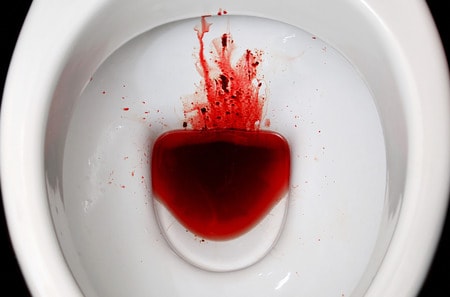Blood in Stool? Here’s Why…
If you have blood in stool and are concerned if this is something worth worrying about, then this article will help you determine how serious your symptoms really are, and whether you need emergency treatment for it.
What you will learn in this in depth article about blood in stool:
- Is seeing blood in stool the first sign you have cancer?
- Does it mean you have an undetected chronic health issue?
- Or is it a minor problem, and nothing to worry about?
In this article you’ll find out the answers to all these questions, as well as:
- What causes blood in stool.
- 5 conditions you could have, and their natural remedies.
- Why the color of your stool is important.
- And the supplement that may be the answer to your prayers.
Going to the toilet isn’t something you normally pay much attention to. However, that can all change when you suddenly start bleeding when pooping.
To add to your fears, you may have some accompanying symptoms like:
- Abdominal pain
- Weakness
- Trouble breathing
- Vomiting
- Heart palpitations
- Bloody diarrhea
- Weight loss
This can make you start to fear the worst. However, before you jump to any conclusions, let’s go through some possible reasons why you’re pooping blood, what the causes are, and what you can do to fix it.
Why You’re Bleeding When Pooping
Pooping blood is usually caused by bleeding in either the upper or lower part of your gastrointestinal tract or, in some instances, because you’re experiencing rectal bleeding. It’s what’s known in medical talk as hematochezia.
In some cases, you can be pooping blood without there being a change in the color of your stool. However, it’s usually obvious to see there’s something wrong as, instead of the normal brown color, it’s bright red or dark black.
What the Color of Your Poop Means
The root cause of blood in stool or bloody diarrhea can come from anywhere in your digestive system, from your mouth right down to your anus. One way to tell where the internal bleeding is coming from and what’s causing it is by paying attention to the color of your stool. This will help you find out if you’re suffering from a serious health condition or some minor problem.
Blood can make your stools a dark black color, a bright red color, or a color somewhere in between depending on where the bleeding is occurring.
If your stools are black, then the bleeding is occurring in the upper part of your digestive region like your esophagus or stomach. This is known as melena, and can have several causes, including:
- Abnormal blood vessels
- A tear in the esophagus from violent vomiting (called Mallory-Weiss tears)
- Bleeding stomach ulcer
- Blood supply being cut off to part of the intestines
- Gastritis
- Trauma
- The presence of a foreign body
- Widened, overgrown veins in the esophagus and stomach
Bright red blood on the other hand, usually means the bleeding is coming from your small or large intestine, rectum or anus. Though, in some instances, it could also be due to heavy bleeding in the upper gastrointestinal tract.
Here are some of the causes of bright red stools:
- Abnormal blood vessels
- Anal fissures
- Bowel ischemia
- Diverticulitis
- Foreign body or trauma
- Hemorrhoids (often the cause of bright red blood)
- Infection in the intestines
- Inflammatory bowel diseases including Crohn’s disease and Ulcerative colitis
- Polyps or cancer in the colon or small intestine
5 Common Causes of Blood in Stool and Their Natural Remedies
There are many natural remedies you can use to treat the root cause of and get rid of blood in stool.
And the most beneficial natural supplement for boosting the immune system and healing the digestive tract is colostrum.
Here are 5 common causes and their natural remedies:
1. Peptic Ulcers
Also known as bleeding stomach ulcers, peptic ulcers are where painful sores develop in the lining of your stomach or the upper part of your small intestine.
If you have a peptic ulcer, then, as well as bleeding when pooping, another common symptom you can have is vomiting blood.
The first step in treating peptic ulcers naturally is to avoid foods which can make them worse, like spicy foods, caffeine, alcohol, refined sugars, and food allergens.
Instead, focus on eating high fiber foods – green leafy vegetables like lettuce, spinach, cabbage, and broccoli. As well as fermented foods like coconut kefir and kimchi.
Also, eating large meals can cause your digestive system to work harder, so eating less food at more regular intervals will give it a break, and help heal your symptoms.
2. Gastritis
This is when the lining of your stomach becomes inflamed or irritated. As well as blood in stool, other gastritis symptoms include belching, nausea and vomiting, bloating, and upper abdominal pain.
To heal gastritis cut out spicy, fatty, and fried foods, as well as acidic foods like tomatoes and oranges as they’ll irritate your stomach.
Eat plenty of vegetables, fruits, high-quality proteins and healthy fats. And try to supplement your diet with foods rich in probiotics, fiber, antioxidants like vitamin C, vitamin B12, electrolytes and omega-3 fatty acids. Also, don’t eat anything within three to four hours before bedtime so you can sleep with your food already digested.
Stress is also a major factor in gastritis, so try to ease your workload, and take some time out to relax. Try my breathwork techniques to turn off stress and put your body in a more relaxed state.
Every Sunday, I offer free breathwork meditations online which are not only great for de-stressing and relaxation, but also have some scientifically proven physiological benefits. You can join one of my upcoming sessions here
You can also try licorice root and eating fennel as both are helpful in reducing symptoms.
3. Diverticulitis
Diverticulitis was rare in the last century, however, it’s now one of the most common health problems in the Western world. It’s a digestive disease where pouches within your large intestine become inflamed. As well as blood in stool, another one of its symptoms is lower abdominal pain which comes on suddenly.
Eating homemade bone broth and bone broth powder will help you to naturally treat your diverticulitis as they’ll improve your gut health. And as your gut will be sensitive, bone broth will help you to be better able to absorb nutrients so you can heal and repair your gut more easily.
Also, as diverticulitis is common among people with diets low in fiber, it helps to eat more fiber rich foods.
4. Crohn’s Disease
Blood in the stool is a typical symptom of Crohn’s disease, a type of inflammatory bowel disease. Though there is a wide variety of drugs that try to treat the symptoms, they do not treat the cause of the disease. There are also many natural remedies.
A common option is using slippery elm. It works by protecting and promoting healing of the irritated tissue in your digestive system. After mixing it with warm water in a glass, it turns into a slick gel which coats and soothes your digestive tract to ease inflammation.
5. Ulcerative Colitis
Another inflammatory bowel disease, ulcerative colitis is also characterized by pooping blood.
The first step in treating it is by changing your diet, most notably by avoiding trigger foods like dairy products, refined sugars, caffeine, alcohol, fizzy drinks and spicy foods.
Stress plays a big role in ulcerative colitis flare-ups, so finding ways to relax will help ease symptoms.
Signs You Should Go to Your Doctor
The above illnesses are some of the most common causes of blood in stool. However, if you’re suffering from a bloody stool as well as the following symptoms, then you should go to your doctor.
- You’ve passed large amounts of blood
- Rapid heart rate
- Lightheadedness
- Weakness
Another common symptom which accompanies blood loss is bloody mucus in stool. This can be common in healthy people’s stools.
However, if you start seeing more mucus in your stool as well as blood and need more frequent trips to the toilet, it can mean you have a serious health condition so you should be examined by a doctor.
Another reason to see your doctor is because, as well as what’s mentioned above, blood in stool can be caused by polyps or cancer.
So if you are experiencing blood in stool, you shouldn’t hesitate to go to a doctor and get a test done to find the root of the problem.
Some of these tests include:
- Angiography
- Barium studies
- Bleeding scan
- Blood work including a complete blood count and more
- Colonoscopy
- Double balloon enteroscopy
- Stool test
- Testing to determine if an H. pylori infection is present
- Upper endoscopy (EGD) or capsule endoscopy
Is a Worn Out Gut the Reason You’re Pooping Blood?
When you were born, your gut was sterile and not yet fully developed. However, when you were breastfed, your mother’s milk nourished it to life.
In fact, your mother’s milk is so vital for your gut, both UNICEF and the WHO recommend newborn babies be breastfed for the first two years of their lives.
It optimizes your gut so your body can get nutrients from the food you eat, eliminate toxins, and have a strong immune system to ward off illness.
However, as you grow up, thanks to modern living, things can take a turn for the worse…
A bad diet, unhealthy lifestyle, emotional distress, and a host of other factors can destabilize your gut’s microflora ecosystem which your mother’s milk helped develop.
Your gut can go so far out of whack, you eventually get leaky gut syndrome. Microscopic holes form in your intestinal lining and “foreign bodies” like particles of undigested food pass through.
Your body attacks itself… switching on the inflammation response, and you can develop a chronic illness like Crohn’s disease, ulcerative colitis, or diverticulitis of which blood in stool is a main symptom.
Give Your Gut the Same Nourishment a Mother’s Milk Gives Her Newborn Child
It’s too late to take your mother’s milk again. However, you can take mother nature’s.
The milk from cows who’ve recently given birth contains the exact same properties as your mother’s did when you were born.
And in the same way your mother’s milk strengthened your gut when you were a baby… taking it will reboot your gut back to full health again.
It has over 97 immune factors and 87 known growth factors which repair the lining of your intestinal wall, fix your leaky gut, and heal the chronic illness which you may be suffering from.
My Personal Experience With Gut Issues
Being someone who suffered from ulcerative colitis a few years ago, I know just how horrible life can be when faced with this type of situation. Even though I was told that I would have to live with the pain and agony of this horrible disease for the rest of my life by doctors, I managed to get rid of the ulcerative colitis using purely natural means. So now I have put together a step-by-step treatment plan to help others do the same




I’m in FL and what’s the preferred method of communication with you?
Hi Ali, please email [email protected]
Small amount of bright blood on toilet paper 3 times in past 2 weeks. I want desperately to avoid the AMA. I am 62 yrs and very health and diet conscious. Any sugestions?